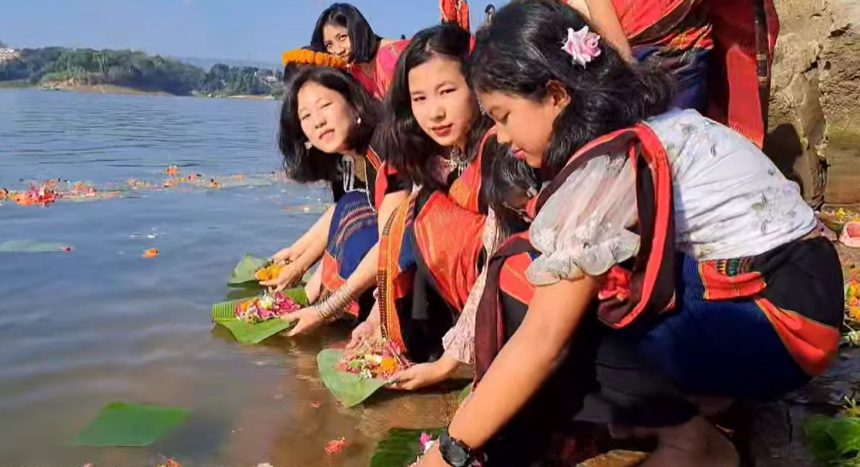The Chittagong Hill Tracts came alive on Saturday as people from various ethnic communities celebrated their most cherished cultural event — Boisabi, marking the end of the Bengali year and the beginning of a new one.
In Rangamati, the day began with a vibrant traditional procession in celebration of Boisabi and Chaitra Sankranti, drawing participation from diverse indigenous groups speaking different languages.
Later, members of the Chakma community observed the first day of their three-day social festival, Bizu. In the “Phool Bizu” ritual, men, women, and children, dressed in traditional attire, floated flowers on the waters of Kaptai Lake, praying for peace and well-being.
The name Boisabi is derived from the initials of three distinct ethnic festivals: the Tripura people’s Boisu, the Marma community’s Sangrai, and the Chakma people’s Bizu. Together, these form a unified celebration of ethnic harmony and cultural heritage in the hills.
In Dhaka, the Jhum Sahitya O Sangskritik Sangsad of Dhaka University brought the celebration to life with a Boisabi procession starting from Jagannath Hall in the morning. Later, participants floated symbolic flowers at Ramna Lake as part of the Phool Bizu observance. The organisation also hosted a discussion titled “May Indigenous Cultures Thrive Through Pluralism” along with an art exhibition featuring participation from hill-dwelling students living in Dhaka.
Simultaneously, another Boisabi procession was organised in the capital by the Ministry of Chittagong Hill Tracts Affairs.
In Khagrachari, the Marma community kicked off a six-day Sangrai festival to welcome the new year, according to news agency UNB. The celebrations include ten traditional games such as Alari (Khoiyat), Riakyaza, and the famous Water Game, which symbolises washing away the sorrows of the past year and starting anew.
The festival was inaugurated under the banyan tree of Pankhaya Para by Khagrachari Deputy Commissioner ABM Iftekharul Islam Khandakar, who remarked, “This festival reflects Bangladesh’s cultural diversity and stands as a symbol of harmony.”
Organised by the Marma Development Society, the traditional games are open to all ages. Organisers hope the event will play a significant role in preserving endangered cultural traditions.
The festival will culminate on Thursday, 17 April, with a prize distribution ceremony. On Pohela Boishakh (14 April), the much-anticipated Water Game will take place, where young people sprinkle water on one another as a symbolic gesture of friendship, renewal, and cleansing.


